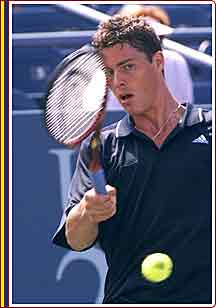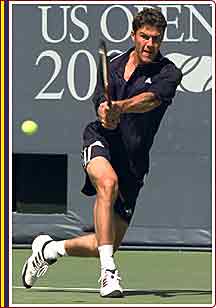Marat Safin: The Samurai Warrior
Jim McLennan
And the story goes, two samurai warriors agree to fight to the death.
The following morning at dawn, they bow, unsheathe their swords, assume a
ready fighting stance, and then wait,... Silently,... Waiting.

Not many baseline winners from Safin, just punishing groundstrokes deep
into the corners.
|
The sun rises, the sun sets, neither samurai has moved. They bow, and
agree to resume their fight to the death the following morning. And so it
goes the following day. But by days end neither has made the first move,
for to make that move would expose them to a potentially fatal counter by
their opponent.
Martial artists of any stripe are focused, they are centered, their moves
fluid. They use only the minimum energy required. And in nearly all
instances they use the energy of their opponents attack and redirect that
energy against them. Replying to the initial attack rather than
initiating, waiting for the opening.
In the US Open final, Safin rallied with Sampras. No winners in these
rallies. Again it must be said, no winners in these backcourt rallies from
Safin, just heavy groundstrokes, placed deep and in the corners. Time and
again Pete initiated, forcing the situation, only to mishit or err. Safin waited for Pete’s play, the bold crosscourt or the chip and
charge, and in nearly all instances Safin replied.
The Big Cat
Safin’s agility
around the court reminded me of “The Big Cat” Miroslav Mecir. And just
like Mecir, Safin took the return of serve early, not exactly crushing the
ball but using Pete’s pace to paint the lines or dip the ball at his
feet. The main difference here is that Mecir did not

When Pete approached, Safin had answers.
|
possess the serve,
and Mecir did not possess the power. Indeed, Patrick McEnroe acknowledged
that this was the first big occasion where Sampras’ opponent was both
quicker and more powerful than he. When Pete approached, Safin had the answers, wickedly disguised cross
court backhands, swooping forehands down the line. But all struck with a
timing that made Pete commit first, and once committed or “off
balance” Safins reply often left Pete late to move.
The telling point of the match occurred towards the end of the second set.
Sampras approached deep to Safin’s forehand corner. Safin’s reply
hooked around the net post, landing precisely in the corner. Truly a
perfect shot, and at that point it looked as though he could hit just
about any shot. And as if to emphasize just that, on the next point, Safin
serves, Sampras returns somewhat weekly and Safin drop shots the greatest
player in the history of the game. Will someone tell me when they have
seen a drop shot used against Sampras?

Safin's backhand is so economical and well timed, it is hard to see how he hits it so
well.
|
Watch Safin at his next outing and look for his posture and “quiet
body” on the backhand. It is hard to see how he hits it so well, the
motion is economical and well timed, and the disguise is exquisite. Far
simpler than a muscular Gambill, more fluid than a
mechanical Phillipousis, and more versatile than nearly all
of the one handed backhands on the tour.
The best line of the US Open coverage, and a testament to Safin’s
prospects, was by Mary Carillo, saying, “This guy Safin is so amazing he
improves on the changeovers” and if so welcome Marat and welcome
the “New Balls”.
In the upcoming year Safin will be “the target” for the up and coming
players. He is now a good win, and this is in contrast to the early part
of last season when his results were poor indeed. The question is whether
his skills will win out over other counter punchers. Counter punchers
playing behind the baseline like Moya or Corretja, will do less damage
than counter punchers playing along the baseline, as Kucera or Kafelnikov.
I suspect his patience and shot selection may be challenged in those
latter instances. For that we will have to wait and see.
Your comments are welcome. Let us know what you think
about Jim McLennan's article by emailing
us here at TennisONE.
|

|
The Secrets of World Class Footwork - Featuring
Stefan Edberg
by Jim McLennan
Learn the secret to the quickest start to the ball, and the secret
to effortless movement about the court. Includes footage of
Stefan Edberg, one of the quickest and most graceful of all the
professionals.
Pattern movements to the volleys, groundstrokes, and
split step reactions. Rehearse explosive starts, gliding movements,
and build your aerobic endurance.
If you are serious about improving your tennis,
footwork is the key.
29.95
plus 2.50 shipping and handling |
|